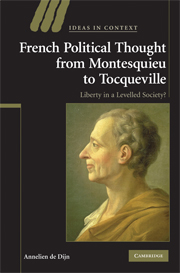Book contents
- Frontmatter
- Contents
- Acknowledgements
- Introduction
- 1 Political thought in eighteenth-century France: the invention of aristocratic liberalism
- 2 Liberty and inequality: the royalist discourse
- 3 A society of equals: the liberal response
- 4 Liberty in a levelled society: Charles Dunoyer, Benjamin Constant, and Prosper de Barante
- 5 The new aristocracy: a theme in Restoration liberalism
- 6 The danger of democracy: Orléanist liberalism and Alexis de Tocqueville
- 7 The French predicament: aristocratic liberalism in the Second Empire
- Epilogue
- Bibliography
- Index
- IDEAS IN CONTEXT
6 - The danger of democracy: Orléanist liberalism and Alexis de Tocqueville
Published online by Cambridge University Press: 22 September 2009
- Frontmatter
- Contents
- Acknowledgements
- Introduction
- 1 Political thought in eighteenth-century France: the invention of aristocratic liberalism
- 2 Liberty and inequality: the royalist discourse
- 3 A society of equals: the liberal response
- 4 Liberty in a levelled society: Charles Dunoyer, Benjamin Constant, and Prosper de Barante
- 5 The new aristocracy: a theme in Restoration liberalism
- 6 The danger of democracy: Orléanist liberalism and Alexis de Tocqueville
- 7 The French predicament: aristocratic liberalism in the Second Empire
- Epilogue
- Bibliography
- Index
- IDEAS IN CONTEXT
Summary
THE JULY REVOLUTION AND ORLEANIST LIBERALISM
In 1830, the Restoration monarchy was overthrown by the July Revolution. Charles X was deposed, and his cousin Louis-Philippe, of the Orléans branch of the Bourbon dynasty, became the new king. The Revolution of 1830 also brought several other institutional adjustments with it, which, however, were mostly of a symbolic nature. The most visible of these changes was the abolition of the hereditary peerage, which was replaced with a Chamber of Peers appointed by the king. Furthermore, the king and his successors would from now on swear fidelity to the constitutional Charter before parliament, instead of making the oath to the deity, depriving them of any aura of divine right. As in the Constitution of 1791, the head of state was ‘King of the French’, supposedly a more democratic title than ‘King of France’. Yet his actual power had only been slightly decreased. The constitutional significance of 1830 lies less in the textual changes to the Charter of 181 than in the conviction of the deputies that they were, by fact and by right, the most powerful element.
In the new political regime, the royalists (now also called ‘legitimists’) lost much of their political importance. Most royalists refused to adapt to the new regime and remained faithful to the exiled Bourbons. They did not take the oath to the new king, which meant that they were excluded from political functions and from public life.
- Type
- Chapter
- Information
- French Political Thought from Montesquieu to TocquevilleLiberty in a Levelled Society?, pp. 129 - 154Publisher: Cambridge University PressPrint publication year: 2008



